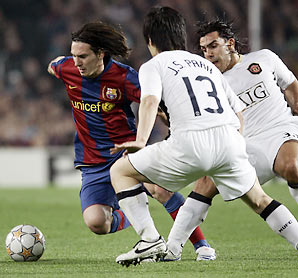What happened to the firepower?
Wayne Rooney and Park Ji-Sung playing as auxiliary fullbacks, while CarlosTévez does a Javier Mascherano impression. Didier Drogba as isolated and alone as Fletcher Christian's men after landing on Pitcairn Island. RafaBenítez being Rafa Benítez, appreciating his Dutch wingers more for their ability to run all day than their offensive contributions.
Call it organization. Call it Catenaccio. Call it diabolical. Call it intelligent. Call it dull. Call it effective. All of the above are probably true to some degree. But there is no question that one truism has insinuated itself into the hearts and minds of three of the English Premier League's big four:
To do well in the knockout phase of the Champions League, you need to treat each tie as one 180-minute game and, more importantly, stopping your opponent from playing is more important than imposing yourself on the game.
"This is what English teams do in Europe now," Frank Rijkaard, the Barcelona boss, said after his team's scoreless draw with Manchester United at the Camp Nou on Wednesday. "They sit back and defend, defend, defend."
When it comes to Liverpool and Chelsea, this is no surprise. Benítez has always based his teams on the same principles. A superb tactician (who occasionally gets things spectacularly wrong: see Didi Hamann in Istanbul), he believes in a very organized back four, plenty of defensive cover in midfield and bursts of pressing up the pitch (which is why the hyperactive Dirk Kuyt and Ryan Babel are in such favor at Anfield).
Chelsea was the same way under José Mourinho and, while Avram Grant was brought in ostensibly to provide entertainment, in fact, little has changed. Or rather, what has changed is that under Mourinho, you had a handsome, well-dressed manager who was adored by the players and who made witty and controversial remarks after games. Now, you don't.
But Man. United is a whole other story. Sir Alex Ferguson's side has historically been synonymous with attacking soccer. And, in fact, even this season, both in the Champions League group stage and domestically, it has served up plenty of entertainment and attacking verve.
Sir Alex's "strikerless system," with Cristiano Ronaldo, Rooney, Tévez and Ryan Giggs shifting positions seamlessly, was a joy to behold. With so much firepower and no fixed reference points, it was extremely difficult to defend, not to mention tactically innovative.
Yet when it comes to the Champions League, it has been a very different United. You saw shades of it against Roma in the quarterfinals. Facing a team without its far and away best player, Francesco Totti, United stuck Rooney and Park wide, man-marked the wingers and, despite being dominated for long stretches, nicked two goals on the counterattack. Even in the return leg, despite the two-goal lead, United sat back and picked its spots.
It was no different at the Camp Nou on Wednesday. United went there with one clear objective: Don't concede and we'll nail them at Old Trafford. In and of itself, it's not a huge deal, it's just weird that, domestically, United is so different.
There are two ways to look at it. On the one hand, United deserves praise for its tactical flexibility. Being able to play one way last Saturday against Blackburn and in a diametrically opposed way four days later against Barcelona is a skill. It demands application, intelligence and discipline, both from the coaching staff and the players.
On the other hand, the result is a very sterile approach, given United's galaxy of stars. And I'm not sure the premise on which it's based, that you have to play that way in Europe is an accurate one.
Take a look at the teams that have won the Champions League in the last 10 years: Real Madrid (3 times), AC Milan (twice), Manchester United, Bayern Munich, Barcelona, Porto and Liverpool. Only the latter two -- plus, arguably, Bayern in 2001 -- played that way.
And, with all due respect, look at who they had up front. Porto had CarlosAlberto and Derlei. Liverpool had Milan Baros and Luis García. Bayern had Giovane Élber. Not quite Tévez, Rooney and Ronaldo.
Are we so sure this kind of approach actually works?





